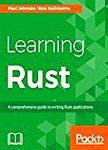版权所有:内蒙古大学图书馆 技术提供:维普资讯• 智图
内蒙古自治区呼和浩特市赛罕区大学西街235号 邮编: 010021

I S B N:(纸本) 9781785884306
出 版 社:Packt Publishing
出 版 年:2017年
主 题 词:Rust programming language compilation Rust standard library
学科分类:08[工学] 0812[工学-计算机科学与技术(可授工学、理学学位)]
摘 要:Start building fast and robust applications with the power of Rust by your side Key Features: * [*] Get started with the language to build scalable and high performance applications * [*] This book will help C#/C++ developers gain better performance and memory management * [*] Discover the power of Rust when developing concurrent applications for large and scalable software Book Description: Rust is a highly concurrent and high performance language that focuses on safety and speed, memory management, and writing clean code. It also guarantees thread safety, and its aim is to improve the performance of existing applications. Its potential is shown by the fact that it has been backed by Mozilla to solve the critical problem of concurrency. Learning Rust will teach you to build concurrent, fast, and robust applications. From learning the basic syntax to writing complex functions, this book will is your one stop guide to get up to speed with the fundamentals of Rust programming. We will cover the essentials of the language, including variables, procedures, output, compiling, installing, and memory handling. You will learn how to write object-oriented code, work with generics, conduct pattern matching, and build macros. You will get to know how to communicate with users and other services, as well as getting to grips with generics, scoping, and more advanced conditions. You will also discover how to extend the compilation unit in Rust. By the end of this book, you will be able to create a complex application in Rust to move forward with. What you will learn: * [*] Set up Rust for Windows, Linux, and OS X * [*] Write effective code using Rust * [*] Expand your Rust applications using libraries * [*] Interface existing non-Rust libraries with your Rust applications * [*] Use the standard library within your applications * [*] Understand memory management within Rust and speed efficiency when passing variables * [*] Create more complex data types